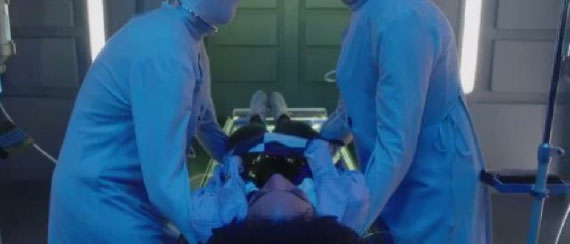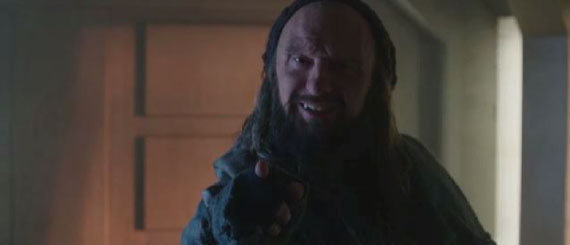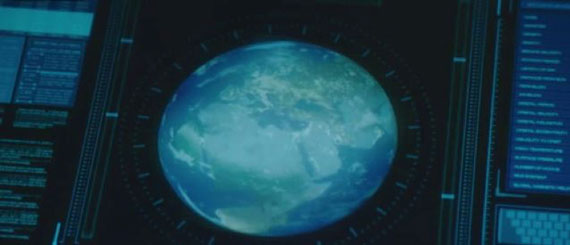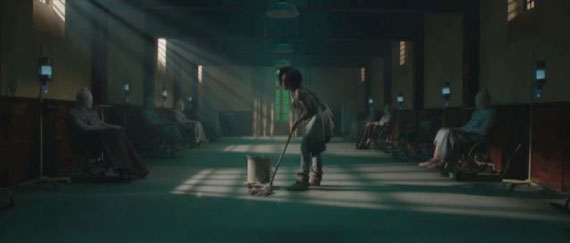Series 10: World Enough and Time Review
Clint Hassell gives his verdict on the eleventh episode of Doctor Who Series 10.

Note: this review contains full spoilers for episode 11 of Series 10.
A Doctor Who series finale is always exciting because it is the point at which the audience can first see how the mysterious pieces of the series-long story arc fit together. This is especially true for a finale written by Steven Moffat, who loves to obscure pertinent pieces of the narrative puzzle, via careful phrasing or editing, throughout the series.
In Series 10, Moffat has presented a methodical deconstruction of the companion experience. It is not surprising that he continues in “World Enough and Time,” using the antagonistic honesty of Missy-as-“Doctor Who” to outline the standard companion’s role (“exposition and comic relief”), their general characteristics (“plucky” – – ironic, because Bill looks anything but, in the scene), and to mock how past companions have been so generic, so “disposable,” that actual names are unnecessary. Further, Missy calls Bill and Nardole her “assistants,” before the Doctor refers to the pair as “companions” – – a lovely handover of titles from the classic era (where “assistant” was more common) to the modern “companion” (itself hardly ever mentioned on-screen).
Of course, Moffat cannot resist revisiting “Doctor Who” one final time, referencing both the show’s enigmatic title and its main character by positing that they are one and the same. Is the Doctor’s real name “Doctor Who”? Pointedly, the Doctor doesn’t deny the fact, and it would explain why Hartnell, Troughton, Pertwee, Baker, Eccleston, and Tennant were all credited as “Dr. Who” or “Doctor Who,” during their tenures. Does Moffat mean this as a canonical revelation? Is the Doctor embarrassed that Missy so callously reveals the secret behind a name he selected early in his maturation, or merely annoyed that she is toying with his companions? The answer is ambiguous, making it a delightfully meta commentary on the Time Lord’s actual name.

Moffat utilizing Missy in place of the Doctor also allows for poignant comparison between the two characters. It’s thought-provoking to see Missy at her Doctor-y best, figuring out that the spaceship is reversing away from the black hole, albeit “very, very slowly.” As Missy deduces that the angled monitors mean that the giant ship was not designed to be piloted by one person, but that something has happened to the additional crew, she sounds exactly like the Doctor, reinforcing that both Time Lords share the same potential. While the two have different methods – – the Doctor walks into a situation and commands attention, giving him time to formulate a plan, while Missy just makes everyone uncomfortable – – they both accomplish the same thing: taking control.
This comparison makes the reappearance of the John Simm Master heartbreaking. Unlike Twelve, who has made peace with his actions as the War Doctor, Missy is losing the fight against the pull of her darker past. Seeing this, Bill questions the Doctor’s plan to test Missy’s reformation: “This is a bad idea . . . . She’s a murderer . . . . What if she just walks out and slaughters everyone, just for a laugh?”

In the episode’s most-layered scene, Bill asks the Doctor, “You’ve got lots of friends – – better ones – – what’s so special about her?” The Doctor responds, “She’s the only person that I’ve ever met who’s even remotely like me.” In a second, Bill’s face registers several thoughts. First, having been mentored by the Doctor, she is hurt that she does not fit that category. She then identifies with the Doctor, as she considers how few people are like herself, due to her color and sexual orientation. Finally, Bill realizes that, since the Doctor sees himself in Missy, he needs for Missy to be good, as it similarly exonerates him. Now empathizing with the Doctor, Bill is more willing to listen to the Doctor’s shared history with Missy.
Seemingly forgetting that she raised Earth’s dead as Cybermen to serve in the Doctor’s personal army, the Doctor refers to Missy and the Master as if they were two separate people, further reinforcing the idea that the Doctor similarly needs to see the War Doctor as a separate being. Unfortunately, Missy is not blameless. “She scares me. She really scares me,” Bill implores, “Promise me you won’t get me killed.” “I can’t promise you that,” states the Doctor, foreshadowing Bill’s death aboard the spaceship.
Steven Moffat masterfully segues this flashback into an examination of the egotistical Doctor. It would’ve been more sensible for the Doctor to have ushered everyone, especially Bill, into the safety of the TARDIS, and then remotely towed the distressed spaceship away from the black holes’ influence. However, that does not make for an exciting episode. For Doctor Who to function as a series, its lead character must feel compelled to follow his wanderlust, despite the inherent dangers of time travel. This trait can be seen as early as Doctor Who’s second serial, 1963’s The Daleks, where the Doctor purposely sabotages the TARDIS, providing an excuse to investigate a futuristic city, on Skaro. In “World Enough and Time,” the Doctor is concerned for Bill’s safety, but seems blinded to prudent action by his need to be the hero, the one who negotiates her safety via his clever genius. There is a certain egotism to the Doctor, partly because he is rarely in the presence of true equals, which is why the potential of a character like Missy (or Romana, Nyssa, Martha, River, or Clara) is so delicious. The consequences of this exaggerated sense of self-importance were examined in The End of Time – – incidentally, the last time Simm’s Master appeared – – so it is apropos to revisit the concept in “World Enough and Time.” Further, the idea of an egotistical Doctor was also seen in “The Girl Who Died,” where Twelve resurrected Ashildr, eventually leading to Clara’s death in “Face the Raven.” The Doctor’s hubris literally gets his companions killed.

It’s interesting, as Moffat continues his farewell tour, touching on many of the themes of his tenure as showrunner, that he revisits “Heaven Sent.” In the penultimate episode of Series 9, the Doctor is trapped in a place where time runs out of step, and he uses subliminal messages to guide himself back to his recently deceased companion. In the penultimate episode of series 10, the recently deceased companion is trapped in a place where time runs out of step, and the Doctor uses subliminal messages to guide her to wait on him. The two episodes mirror each other quite nicely, though the latter does little to capitalize on their similarities.

Another minor problem is that the episode does a poor job of conveying the amount of time Bill is separated from the Doctor. She spends 2.84 years toiling in the bottom of the ship, yet, with no telltale signs of a deteriorating wardrobe or a hairstyle change, and with little context from the dialogue, she seems oddly complacent – – more “inconvenienced” than “trapped.” Is this brilliant character work? Maybe. Maybe, this is who Bill is, after waiting six months to be reunited with the Doctor, in “The Lie of the Land.” However, it is difficult to dive into her mental state, without the sense of time made abundantly clear.
Unfortunately, the majority of the episode – – literally everything after Bill’s post-death flashback – – teases secrets the audience already knows is coming: that Bill has been cyberconverted and that John Simm will reappear as the Master. This is a problem because the episode has little more to offer in its second and third acts than these reveals. Littered with cyber-specific buzzwords, including “conversion” and “upgraded,” that even a novice Whovian would immediately recognize, “World Enough and Time” still parades proto-Cybermen in front of both the Doctor and Missy, and neither suspect a thing. In fact, the episode is unintentionally comical as it cuts between Missy and the Doctor simultaneously figuring out that the ship was headed to Mondas and is now infested with Cybermen – – reveals the audience figured out 20 minutes prior. Is it Moffat’s fault that the BBC’s publicity team spoiled what was meant to be a jaw-dropping moment in the finale? No, of course not. However, one of Moffat’s greatest assets as showrunner is that he is acutely aware of hype and how to manage it, trolling the audience and manipulating the media to generate viewers. Here, Moffat seems to ignore his years of experience, building an episode solely around a reveal he surely knows will be spoiled, resulting in an episode that lacks depth, beyond its first act.








